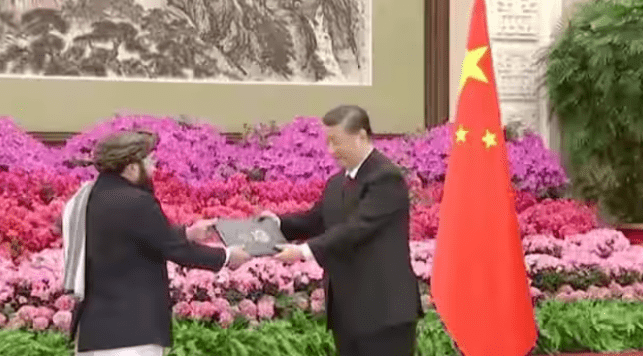The Taliban envoy to China is welcomed by Xi Jinping as Kabul-Beijing ties progress.
Chinese top leader Xi Jinping accepted the credentials of the envoy of Taliban-run Afghanistan in Beijing in a major formalisation of the regime partly constituted by the UN-designated terrorists. Xi Jinping received the credentials of the Afghan ambassador during an official ceremony.
Beijing’s move is a reciprocation of the Taliban’s step in September 2023 when it welcomed Zhao Sheng as Chinese ambassador in Kabul. Taliban-run Afghanistan government’s foreign minister Amir Khan Muttaqi had hailed the nomination of Zhao Sheng as a “significant step with a significant message”.
China’s Xi on Jan 30 welcomed Bilal Karimi as an ambassador to Beijing and accepted his credentials as a special representative of the so-called Islamic Emirate of Afghanistan.
China-Taliban ties
China has declared that it respects Afghanistan’s national sovereignty and has declined to comment on the deteriorating state of women’s rights in the country since the Taliban stormed to power.
Besides, mining contracts are already managed by China in Afghanistan.
The country is part of Xi Jinping’s ambitious Belt and Road Initiative, a transcontinental trade project mired in accusations of exploitative practices. However, the inclusion of Afghanistan into BRI occurred during democratically-elected President Ashraf Ghani’s tenure.
After the withdrawal of US forces from the country that consequently put the Taliban at the helm of affairs, there emerged a crucial element of scepticism in Beijing’s corridors of power over Afghanistan being part of the BRI. 
The country is part of Xi Jinping’s ambitious Belt and Road Initiative, a transcontinental trade project mired in accusations of exploitative practices. However, the inclusion of Afghanistan into BRI occurred during democratically-elected President Ashraf Ghani’s tenure.
After the withdrawal of US forces from the country that consequently put the Taliban at the helm of affairs, there emerged a crucial element of scepticism in Beijing’s corridors of power over Afghanistan being part of the BRI. 
The country is part of Xi Jinping’s ambitious Belt and Road Initiative, a transcontinental trade project mired in accusations of exploitative practices. However, the inclusion of Afghanistan into BRI occurred during democratically-elected President Ashraf Ghani’s tenure.
After the withdrawal of US forces from the country that consequently put the Taliban at the helm of affairs, there emerged a crucial element of scepticism in Beijing’s corridors of power over Afghanistan being part of the BRI. 
This is because of the security threats posed by terrorists and separatists in China’s restive Xinjiang province, bordering Afghanistan.
Recently, Afghanistan’s Taliban government completed the country’s first road link with China, extending the country’s previous democratically-elected government’s aim for increased connectivity and trade with its eastern neighbour.
Analysts predict that Beijing is likely to approach the situation cautiously. China is yet to proceed with the potential flow of trade through the newly constructed route.













